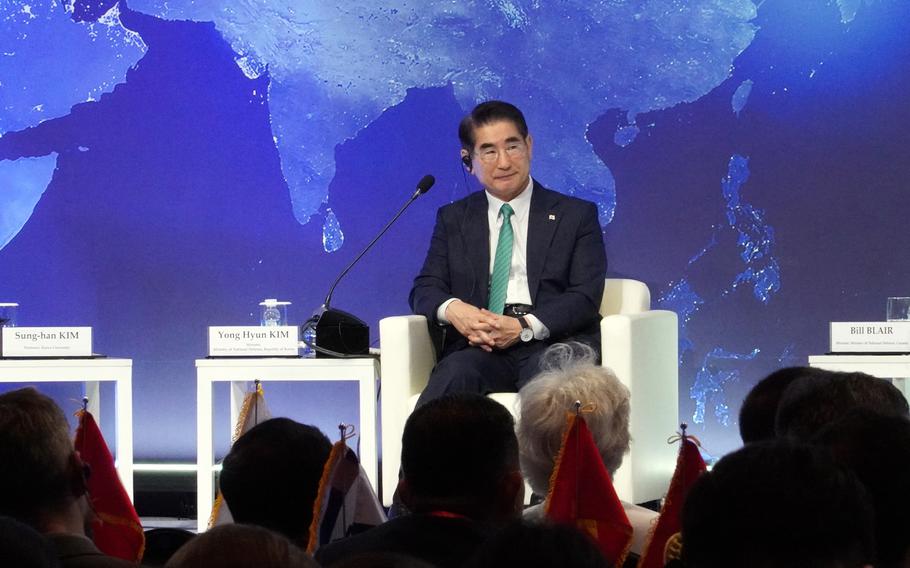
South Korean Minister of National Defense Kim Yong Hyun speaks at the Seoul Defense Dialogue in Seoul, South Korea, Wednesday, Sept. 11, 2024. (David Choi/Stars and Stripes)
SEOUL, South Korea — The U.N. Command is a matchless organization combating North Korea’s provocations during an era in which the “security situation on the Korean Peninsula is graver than ever,” South Korea’s defense minister said Wednesday.
The North continues to neglect “the suffering of its people” by diverting state funds and resources to prioritize its weapons program, Kim Yong Hyun said at the annual Seoul Defense Dialogue.
Kim was sworn in last month after his predecessor, Shin Won-sik, became South Korea’s national security adviser. He mentioned during his speech the thousands of balloons carrying trash sent by the North since May and the communist regime’s GPS jamming campaign at the border.
“Despite the strong opposition of the international community, North Korea continues to enhance its nuclear and missile capabilities,” Kim told an audience of diplomats and military officials from over 60 countries. “North Korea has diversified its provocations by employing methods such as cyberattacks, GPS jamming and even the bizarre tactic of releasing trash balloons.”
North Korean leader Kim Jong Un on Monday called for an increase in his country’s production of nuclear weapons due to threats posed by the U.S.-South Korea alliance, according to the state-run Korean Central News Agency.
The U.N. Command, a multinational organization established by the U.N. Security Council at the onset of the 1950-53 Korean War, is unique because of its history and because it is at the forefront of Pyongyang’s ire, Defense Minister Kim said at the conference sponsored by South Korea’s military.
No other organization like the U.N. Command is possible due to the current political climate on the Security Council, Kim said, adding that “some countries” within the council are likely to veto future resolutions that would create an identical group during war.
In recent years, China and Russia have either vetoed or abstained from voting on Security Council resolutions aimed at North Korea.
In 2022, Beijing and Moscow vetoed a U.S.-led resolution to condemn North Korea’s testing of intercontinental ballistic missiles and to strengthen existing sanctions.
China and Russia’s delegations said sanctions enforcement against North Korea were inhumane, and that the U.S. and its allies ought to pursue a peaceful dialogue with Pyongyang.
“Because we have these member states at the U.N. Command … when there is another war in [South Korea], they are able to fight without authorization from the U.N. Security Council,” Kim said. “And that’s why the [command] is extremely important and is quite significant.”
The Security Council proposed a U.S.-led coalition to defend South Korea following the North’s surprise invasion on June 25, 1950. Ten of the 11 member states on the council voted for the resolution or abstained on July 7, 1950. The Soviet Union was absent during the vote, protesting Taiwan’s seat at the U.N. in lieu of Chinese delegates.
Twenty-two countries provided combat forces or medical support to the command during the three-year war. The command is now composed of 18 member countries and was most recently joined by Germany on Aug. 2.
Toward the end of his remarks, Kim stood and bowed before the audience, thanking the representatives of countries that assisted the South during the war.
“As long as [South Korea] exists, we will never forget the sacrifice and contribution that you made,” he said.